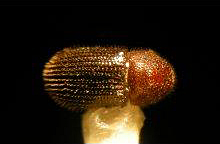
The University of Hawaiʻi at Mānoa’s College of Tropical Agriculture and Human Resources is mobilizing community support to fight against the coffee berry borer, the worst production risk faced by coffee growers in Hawaiʻi today.
Coffee berry borer infestation
The coffee berry borer was first discovered in South Kona in August 2010 and has since spread rapidly. At present all of Kona is considered infested, and the pest has also been found in the neighboring Kaʻū coffee growing areas.
As with many other invasive species, it may be only a matter of time before all Hawaiʻi coffee-growing regions become infested by this beetle. Some growers have reported near 100 percent losses due to coffee berry borer, and the industry will not survive if this pest cannot be controlled.
Fighting the coffee berry borer
This past January, 24 agricultural professionals met for a two-day Ag Professionals Coffee Berry Borer Summit: CBB Integrated Pest Management Methods and Protocols for Hawaiʻi. The event was organized by Andrea Kawabata and Stuart T. Nakamoto of CTAHR’s Risk Management Hawaiʻi and Local and Immigrant Farmer Training programs.
The goal of the summit was for scientists and the industry to establish an agreed-upon and updated protocol to help reduce growers’ confusion about more efficiently combating coffee berry borer in Hawaiʻi. The standard protocol for growers to manage coffee berry borer emphasizes field sanitation, sampling and monitoring, timely harvesting, effective processing, strict quarantine procedures, and spraying of Hawaiʻi Department of Agriculture approved fungal biocontrol Beauveria bassiana products.
Additional recommendations
- Growers are encouraged to be proactive by staying informed, responsive, and connected. Growers can join a local coffee organization. They can also email Gina Bagarino or call (808) 322-4892 to be added to the CTAHR extension coffee contact list.
- Processors can support growers who are controlling coffee berry borer by implementing a sliding scale payment system, so that those who actively manage their coffee farms are rewarded for their good husbandry with top dollar. Summit participants suggest processors avoid paying for coffee cherry with cash. According to law enforcement officials, cash payments of agricultural products may promote thievery.
- Consumers can support the local coffee industry and sustainable agriculture by purchasing coffee grown and processed in Hawaiʻi and by visiting coffee farms to learn from the farmers about their dedication and commitment to growing Hawaiʻi’s world-renowned coffee.
—Adapted from a UH Mānoa news release

